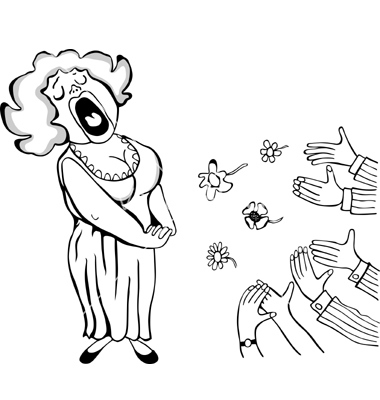I NEED YOUR INPUT!
Those of you who have been following me for a while know that I’m always trying, with these newsletters and with everything that I make available, to provide valuable content that can be useful and make a difference in your life.
For this reason, I invite you to email me with any suggestions, feedback, requests you might have regarding what you would like to receive in the future that would be helpful to you and your activity as a singer.
My email address: info@vocalbliss.net
Thank you!
Ramesha
__________________________________________________________________________
High Notes Are Not Hard!
by Ramesha Nani

One of the main goals of every singer is to extend their vocal range. Too many singers, alas, pursue this goal by straining and eventually ruining their voice. This is partly due to the many bad examples that can be found among the so called “professional” singers, as well as misinformation found on the internet. Of all the ways that one can sing, there’s only one that is physiologically correct and that fosters vocal health and longevity: by relaxing and expanding, rather than by squeezing and tightening.
Is it possible to sing high and even very high notes without strain? Absolutely! In fact, it is the only way, if you don’t want to ruin your voice. Here’s how you do it:
The ability to sing high notes without effort depends on the ability to access your high range, called “head voice”, or “head register”. In order to access it, it’s important to:
- Stay relaxed and not push the voice
- Open and expand the throat
- Open the mouth wide
- At first, decrease the volume. It’s harder to get into your upper range when singing loud. Once you know how to do it, you can sing loud or soft, it won’t matter.
- Don’t be impatient! It might take time to develop and strengthen the muscles that operate the head voice. Some people don’t ever use them until they take on voice training.
One of the best ways to start is to hit and hold some relatively high notes singing in falsetto, and then gradually open the mouth and expand the throat. At first, your high notes will probably sound airy and thin. That’s absolutely normal. Keep practicing! As you do that, you will notice that your sound becomes deeper and more robust. Maybe still airy, but less thin. Gradually, you will strengthen your throat muscles as the sound becomes stable and strong, more and more similar to a “real” voice. Tip: practice on all the vowels (eee, ay, ah, oh, ooo). You need all of them to be able to sing a song!
I created a couple of videos in the past showing this process. Click here and here to watch them.
Don’t be impatient as you practice and learn this technique. It may take a while to get to the point where your voice is strong and loud in your upper range. However, in my experience, this is the safest way to learn to sing high notes without effort or strain.
__________________________________________________________________________